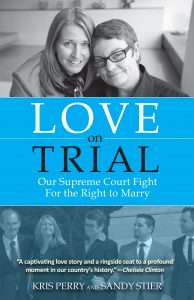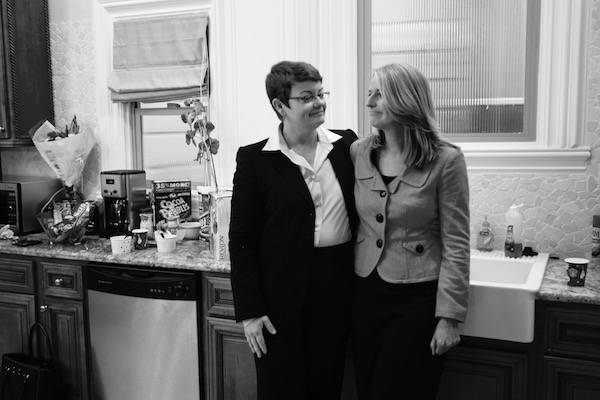Over 20 years ago, when Kris Perry and Sandy Stier met, not only did they not know they would fall in love, but they definitely wouldn’t have guessed that their love would make history.
Living in Berkeley, they were a modern family, but without the protections of legal marriage and the social acceptance it confers.
In 2008, when a slim majority of Californians voted for Proposition 8, banning same-sex marriage, Perry and Stier had been a couple raising their four sons for almost a decade. Soon afterward, they became the lead plaintiffs in the team that sued the state of California to repeal the initiative.
Their new book “Love on Trial,” tells the story of each woman’s journey from her 1960s all-American childhood to the US Supreme Court, sharing tales of growing up in rural America, coming out to bewildered parents, falling in love, and finally becoming a family.
They describe the book as, “a fun, personal, poignant memoir of two ordinary women growing up in small-town America who end up falling in love with each other, blending their families, and fighting for the right to marry all the way to the Supreme Court.”
We spoke to the couple about their new book, their journey and being in the public eye.
How did you meet?
Kris: In 1996, Sandy was teaching a “learning to use computers” class in our office in Oakland, CA. I was a social worker, investigating child abuse and neglect, and the second I saw her, I knew I had to know her. She was a patient teacher who won over a bunch of cranky social workers with her jokes while teaching us how to use a mouse. When the class was over, I figured out where Sandy’s office was and made a point of visiting her at her desk and pretending to have questions about WordPerfect.
 Why was it important for you to write, “Love on Trial?”
Why was it important for you to write, “Love on Trial?”
We wanted to tell our story from our perspective. The story of the case has been told on screen and in books from the perspective of journalists and lawyers. For us, our story is a love story; a love story that started in an “Introduction to the Computer” class more than twenty years ago. We fell in love long before it seemed like we could be legally married, and we did everything we could to protect each other and our blended family short of having the legal protections that marriage affords. We wanted to write about our experiences so we could hand our story down to our children (and we hope grandchildren). We hope “Love on Trial” inspires others to fight for what they believe in—and to remember to laugh along the way. Because if you’re not laughing, you’re not paying attention—even in the Supreme Court.
In this book, you share your journey from childhood to today. Why did you decide to include your entire life?
At our advanced ages, we realized we had to write a memoir or we would forget everything that happened when we were younger. We also felt a strong desire to share our personal stories after the 2016 election. So many rights that were won during the eight years of the Obama
administration seem endangered under the current administration. Marriage equality has been politicized, but it’s a deeply personal fight for us that started before we met each other, blended our family, or wanted to be married to each other. We hope that our stories, as well as the bravery of so many others—including our sons and parents—will inspire others to fight for equality.
When you decided to sue the state of California, did you think that it could turn out to be something bigger?
We did not know how the court would rule when we sued California in federal court. We did know that the voters of California had voted to take away our constitutional rights based on a political campaign filled with animus. As our case traveled through the appellate process, we became aware of the possibility of ending up at the US Supreme Court. That idea was both thrilling and terrifying.
Did you ever feel like you were carrying the weight of the entire LGBTQ community on your shoulders?
We were keenly aware of how many other couples and families wanted the same rights we did. We knew families just like us who were experiencing discrimination and needed the protections and benefits that only marriage offers to feel safe and equal. The most surprising part of the process was the pressure of testifying in court. The other side could have cross-examined us, could have tried to embarrass or humiliate us for loving someone of the same sex. We worried that if we didn’t do well on the stand, we would let many people down.
You have four sons. How have they played a role during this journey?
Our sons have been very connected to us and subsequently to this struggle from the beginning. When we filed, our youngest sons were in 8th grade and the older boys were in high school
and college. Our involvement in the case brought us all closer together but at times strained our relationships as the boys branched out on their own and we became increasingly involved in the case. The Supreme Court ruling came down just ten days after our youngest graduated from high school. The boys—and their support and patience—inspired us to keep fighting.
What do you hope your kids will take from your fight for marriage equality?
You have to fight for what you believe in; you have to take a stand; and you have to make a sacrifice if you want to get something done that’s bigger than yourself.
What do you hope people will take away from your book?
Love is worth fighting for. Our case would not have been successful without the involvement of many other people, including those who came long before us. We all ride on the shoulders of those who fought and sacrificed before us. Sandy and I are keenly aware of that privilege, and we are grateful to have had a role in paying it forward to the next generation.


